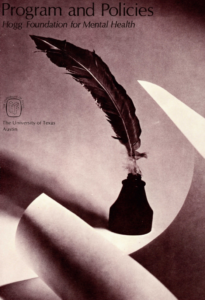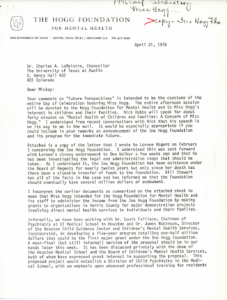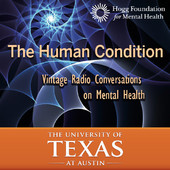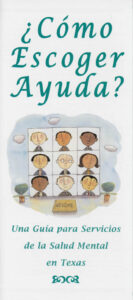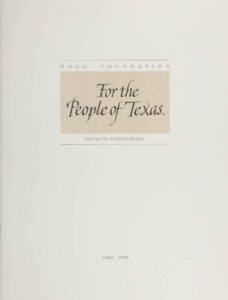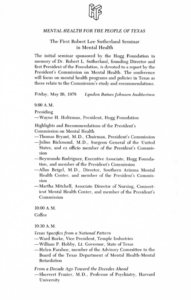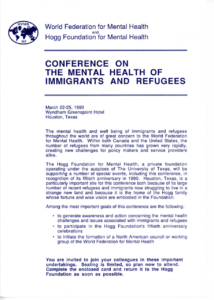Archive Collection Highlights

The Hogg Foundation Archive
The Hogg Foundation seeks to transform how communities promote mental health in everyday life, but we also recognize the impact of history on the communities we serve. The foundation’s archive, which has records dating back to the 1940s, provides historical context for understanding the current mental healthcare landscape.
The in-house collection contains 150 linear feet of paper files and 650 GB of digital files. While some of this material is available online, there is so much more to be discovered. The archive is open to the public for research, but appointments must be made by contacting the archivist at hogg-archives@austin.utexas.edu.
Collection Highlights
Our archive categorizes material by broad themes. We collect records related to Hogg Foundation grants and programs; material created by our Communications department over the years; administrative records; photos, pamphlets, and other materials from events; files from the Foundation’s Executive Directors and staff; photographs in physical and digital format; and artifacts and other materials related to the Hogg family. Scroll through this slideshow to glimpse some of our offerings, and please feel free to reach out with any questions.
State Hospital Reform movement (1950s)
From the Grant & Program Records collection
As part of a larger campaign to reform and modernize the state hospital system in Texas, the Hogg Foundation presented its own vision for mental health services in April 1956, with the release of In a Strange Land. The thirty-minute documentary film was written by program officer Bert Kruger Smith and produced by the Foundation with support from the film department of the University of Texas and the Texas Jaycees. Shot entirely at Terrell State Hospital, the film dramatically portrays the lives of people with mental illness, both inside and outside the state’s inpatient psychiatric facilities.

Zavala County Mental Health Outreach Program (1970s)
From the Grant & Program Records collection
This program, which was active from 1971-1974, brought mental health services to the underserved Mexican American community in Crystal City, Texas. Hogg Foundation staff worked with UT Health Science Center and local leaders to promote mental wellness through holistic community improvement initiatives including a Thanksgiving dinner for the elderly, a Christmas party for children, and assistance with filing taxes and obtaining license plates. Though the program met challenges regarding community distrust, it succeeded in encouraging the Texas Department of MHMR (today known as Texas Health and Human Services) to invest more in the region.

The First National Congress of Black Professionals in Higher Education (1970s)
From the Grant & Program Records collection
This national convening, funded in part by the Hogg Foundation, brought Black people from all over the country together in Austin for a three-day conference in 1972. The program included workshops on 5 primary areas of concern: research, curriculum and instruction, administration, public service, student personnel, and student development. Three publications emerged from the convening, including “Policy Statements,” “Report of the First National Congress of Black Professionals in Higher Education,” and a directory of Black professionals in predominantly white universities. The conference held space for Black academics to connect, reflect, and organize to improve their conditions at historically segregated universities.

School of the Future (1990s)
From the Grant & Program Records collection
From 1990 to 1995, the Hogg Foundation funded the School of the Future, a demonstration project involving elementary and middle schools in four Texas cities: Austin, Dallas, Houston, and San Antonio. The program was conceived to deliver a range of health and human services, with a focus on early intervention and prevention, to low-income students—predominantly students of color—and their families.
Programs and Policies (1977)
From the Administrative Records collection
This 1977 publication offers a sweeping overview of the Hogg Foundation’s work during its first three decades. It particularly addresses changes to the Foundation’s approach in those years—from promoting mental health education to funding more direct services and programs. At the time of writing, the Foundation centers “young children and disadvantaged people” in its programs. Lastly, the report offers potential grantees an in-depth introduction to the Foundation’s grant application process.
Letter from Wayne Holtzman regarding the Ima Hogg Endowment (1976)
From the Administrative Records collection
In this 1976 letter from Hogg Foundation President Wayne H. Holtzman to UT Austin Chancellor Dr. Charles A. LeMaistre, Holtzman writes about a planned conference called “Future Perspectives” featuring an “entire Day of Celebration honoring Miss [Ima] Hogg.” He also clarifies the role of the Hogg Foundation for Mental Health in relation to the Ima Hogg Foundation, which supported the provision of direct mental health services to Harris County-based families and is now part of the broader Hogg Foundation endowment.
The Human Condition radio show (1971-1983)
From the Communications collection
The Human Condition was a radio series produced by the Foundation that ran from 1971 to 1983. The series was broadcast weekly by stations that subscribed to the Longhorn Radio Network. It featured conversations on subjects that spanned the full range of human interest, including mental health. Guests included historically notable figures such as Dr. T. Berry Brazelton, Roy Wilkins, Karl and Roy Menninger, Oscar-winning actress Mercedes McCambridge, and numerous others.

Pamphlets on special topics in mental health (1940-2020)
From the Communications collection
These pamphlets, published by the Hogg Foundation over the last 80 years, offer educational materials about mental health and inform the public about various Foundation-funded programs. Also included in this collection are reports created by the Foundation’s Policy team.
Annual Reports (1962-2003, 2012-2020)
From the Communications collection
These reports, which used to be published annually by the Hogg Foundation, summarize major programs and initiatives in which the Foundation invested. Further, the reports demonstrate that the Foundation has always taken a holistic and integrated approach to promoting mental wellness by funding education, research, and community improvement projects.
Robert Lee Sutherland Seminar 1 (1978)
From the Events collection
This is the agenda for the First Robert Lee Sutherland Seminar in Mental Health on Friday, May 26th, 1978. A summary of the event reads, “The initial seminar sponsored by the Hogg Foundation in memory of Dr. Robert L. Sutherland, founding Director and first President of the Foundation, is devoted to a report by the President’s Commission on Mental Health. The conference will focus on mental health programs and policies in Texas as these relate to the Commission’s study and recommendations.” Speakers included Wayne H. Holtzman, then President of the Hogg Foundation, as well as Surgeon General of the United States Dr. Julius Richmond; Texas Lieutenant Governor William P. Hobby; Harvard University Psychiatrist Dr. Shervert Frazier, and Hogg Foundation Executive Associate Reymundo Rodriguez, who was a member of the President’s Commission on Mental Health at the time. First Ladies Rosalynn Carter and Lady Bird Johnson were also in attendance.
Conference on the Mental Health of Immigrants and Refugees (1990)
From the Events collection
This summary and agenda describe a conference hosted by the Hogg Foundation in Houston on March 22-25th, 1990. At a time when the number of immigrants and refugees was growing throughout North America, the Foundation—in its fiftieth year—aimed to raise awareness about the mental health landscape for immigrants. Additionally, the Foundation hoped “to initiate the formation of a North American council or working group of the World Federation for Mental Health.” Speakers included academics working in public health, psychiatry, and history; the UN High Commissioner on Refugees; and service providers from various nonprofit and public sector agencies. Importantly, the conference held space for refugees from Southeast Asia and Central America to offer firsthand accounts of their experiences.
Ida Fischer reflects on Robert Lee Sutherland (2000)
From the Director & Staff Files collection
In this audio recording, Executive Assistant Ida Fischer recalls the work habits of the Hogg Foundation’s founding Director and first President, Dr. Robert Lee Sutherland. Ida shares that Dr. Sutherland did much of his work for the Foundation off-campus in a small, un-air conditioned office. Her recollections not only memorialize the day-to-day activities of the Foundation’s first Director but also reveal the flexibility in the organization’s early days.
Adrian Fowler reflects on her experience as the first African American Program Officer (2000)
From the Director & Staff Files collection
In this interview, the Foundation’s first Black Program Officer Adrian Fowler recalls balancing her role with a desire not to be seen as a “representative for the entire Black community.” She shares how her civically engaged upbringing in Texas prepared her for the relational work at the heart of the Program Officer position. Her approach always emphasized meeting communities where they are and relaying their perspectives to the Foundation from her liaison role. She also reflects on her work advising a student group at UT, bringing cultural competency resources to medical students, and starting a summer program for students of color seeking careers in the medical field.

Whimsical scrapbook made by Foundation staff (1961)
From the Director & Staff Files collection
This green scrapbook titled “Progress Report” (but missing a few letters due to its age) was created by Hogg Foundation staff in 1961 to review their work, albeit with a sense of humor. Collaged cutouts depict staff humorously, while black and white photographs demonstrate the hard work at the core of the Foundation’s mission. The 17 page document offers a glimpse at the close-knit work environment cultivated by early Foundation staff.

Bernice Milburn Moore and the chaplains (1960s)
From the Photographs collection
Beginning in 1956, the Hogg Foundation hosted a series of professional development trainings for United States Air Force chaplains on UT’s campus. During month-long seminars, the Foundation hosted groups of 30 chaplains for an intensive course from UT faculty specializing in behavioral and social sciences. Dr. Moore, pictured here with one such class of chaplains, served as the director of the program.
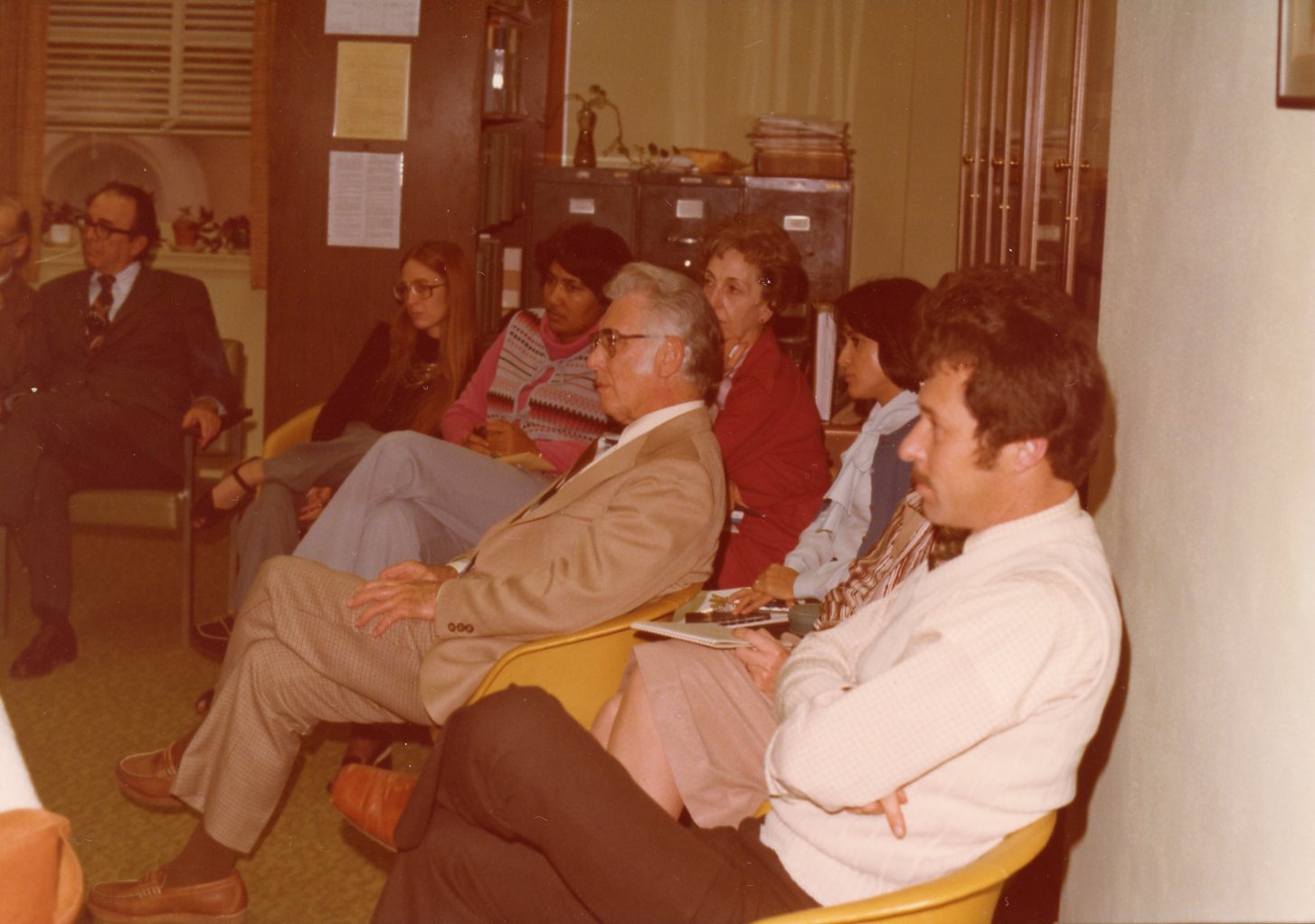
National Advisory Council meeting (1976)
From the Photographs collection
This photo is from the 1976 annual meeting of the National Advisory Council. Appointed by the Executive Director of the Foundation, members of the National Advisory Council guide Foundation staff on matters related to strategic planning, major grant initiatives, and other priorities. Familiar faces in the photo include Foundation staff Adrian Fowler, Bert Kruger Smith, and Executive Director Charles Bonjean.
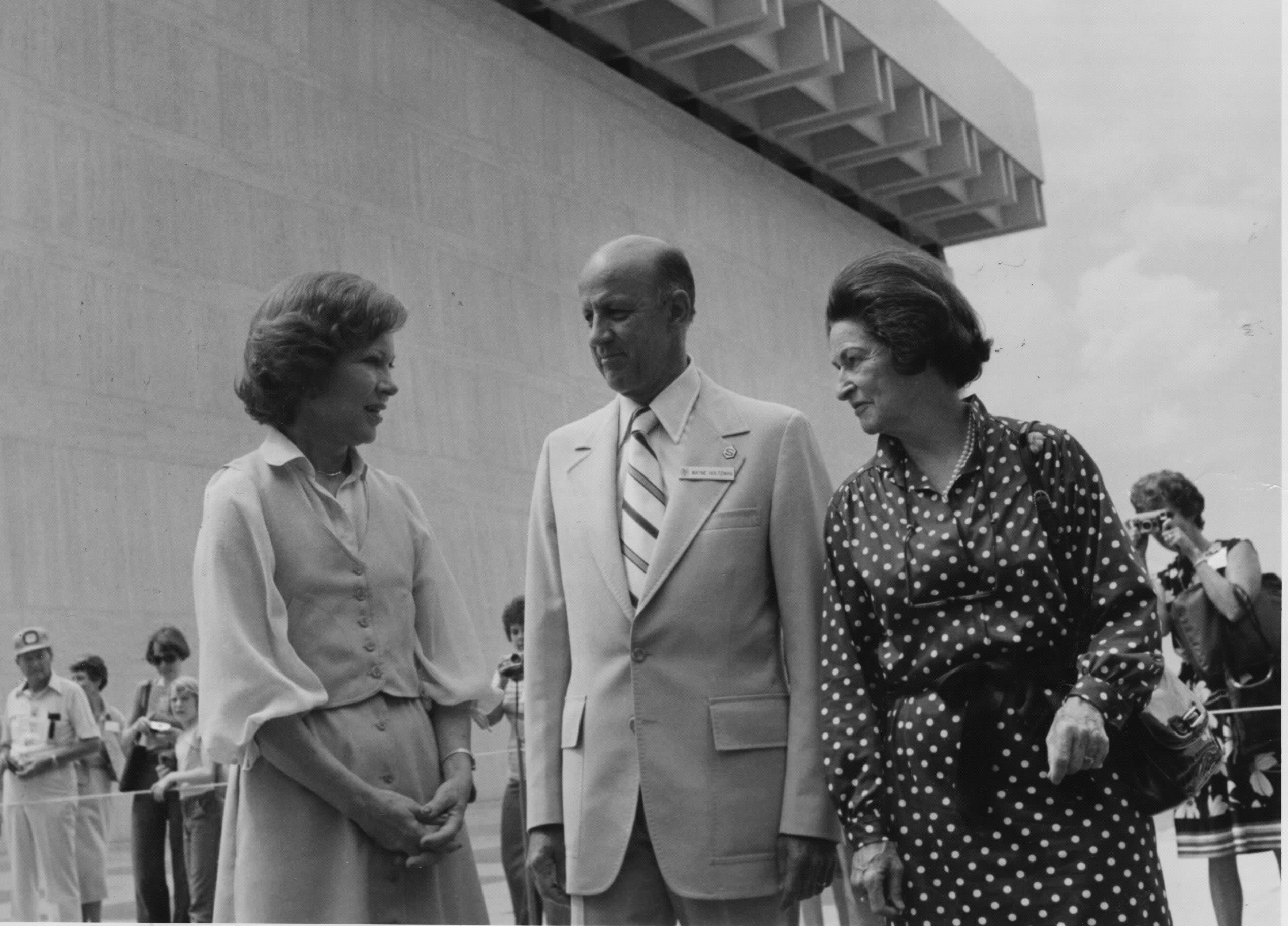
Wayne Holtzman with Rosalynn Carter and Ladybird Johnson at the first Robert Lee Sutherland Seminar (1978)
From the Photographs collection
This photo, taken at the first Robert Lee Sutherland Seminar in 1978, features then Hogg Foundation Executive Director Wayne Holtzman alongside First Lady Rosalynn Carter and former First Lady, Lady Bird Johnson. The trio is pictured standing outside the LBJ Library on UT’s campus.
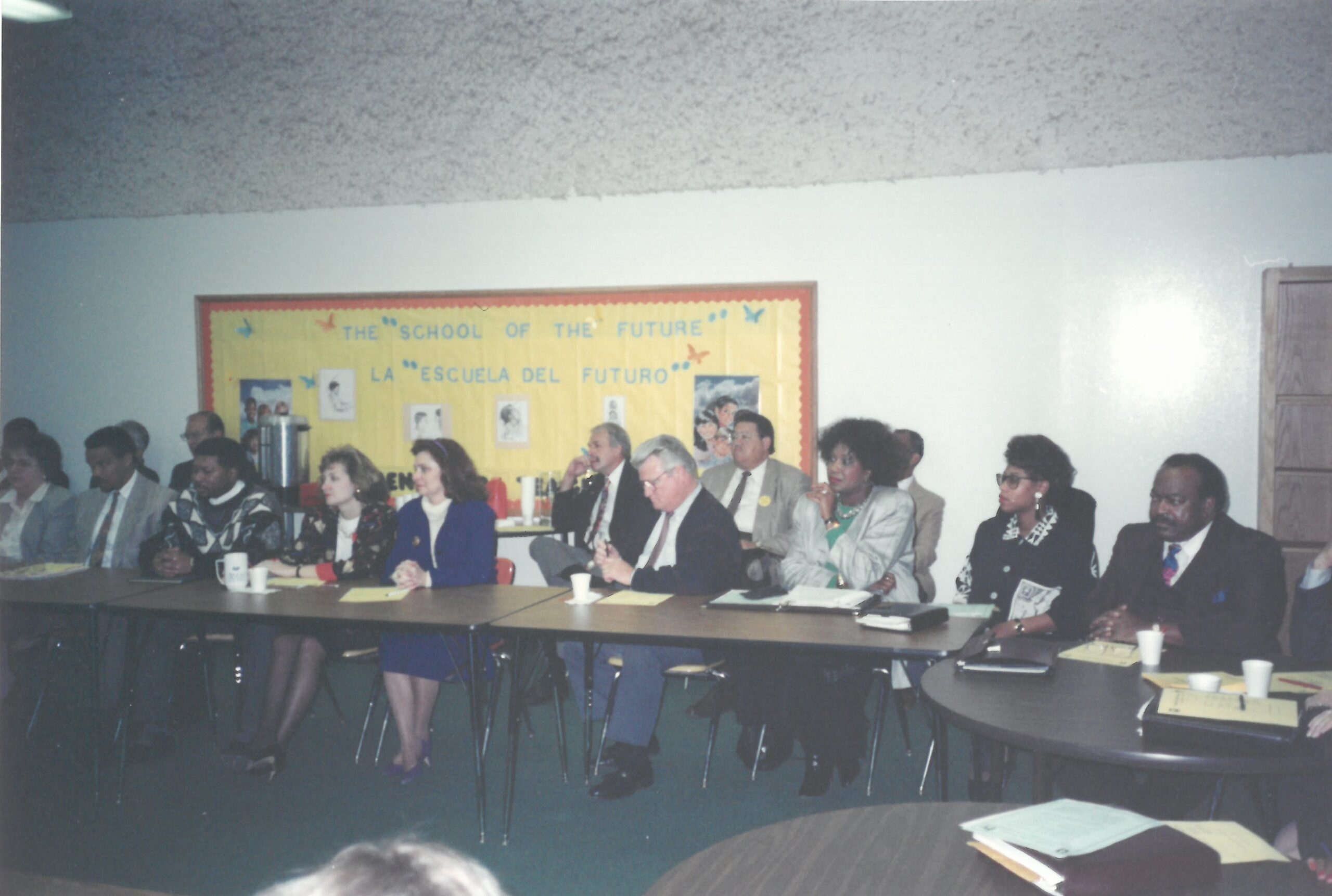
School of the Future meeting (1990s)
From the Photographs collection
In this photo from the early 1990s, a diverse group of educators is seated in front of a bulletin that reads “School of the Future” and the Spanish translation, la “Escuela del Futuro.”
Ima Hogg reflects on her late brother Will Hogg (1967)
From the Hogg Family collection
In this interview from 1967, Ima Hogg recalls her brother’s introverted behavior growing up. She remembers Will as a dedicated student and “bookworm” with ambitions of being a Methodist minister. After a stint at Southwestern University in Georgetown, Will briefly decided to study law instead before moving to San Antonio. His professional ambitions eventually led him to St. Louis, Missouri, where Ima maintains Will experienced a drastic change to his personality. Suddenly her brother was “outgoing, breezy” and “an extrovert.” Ima recalls how he became more introverted again in the last few years of his life.
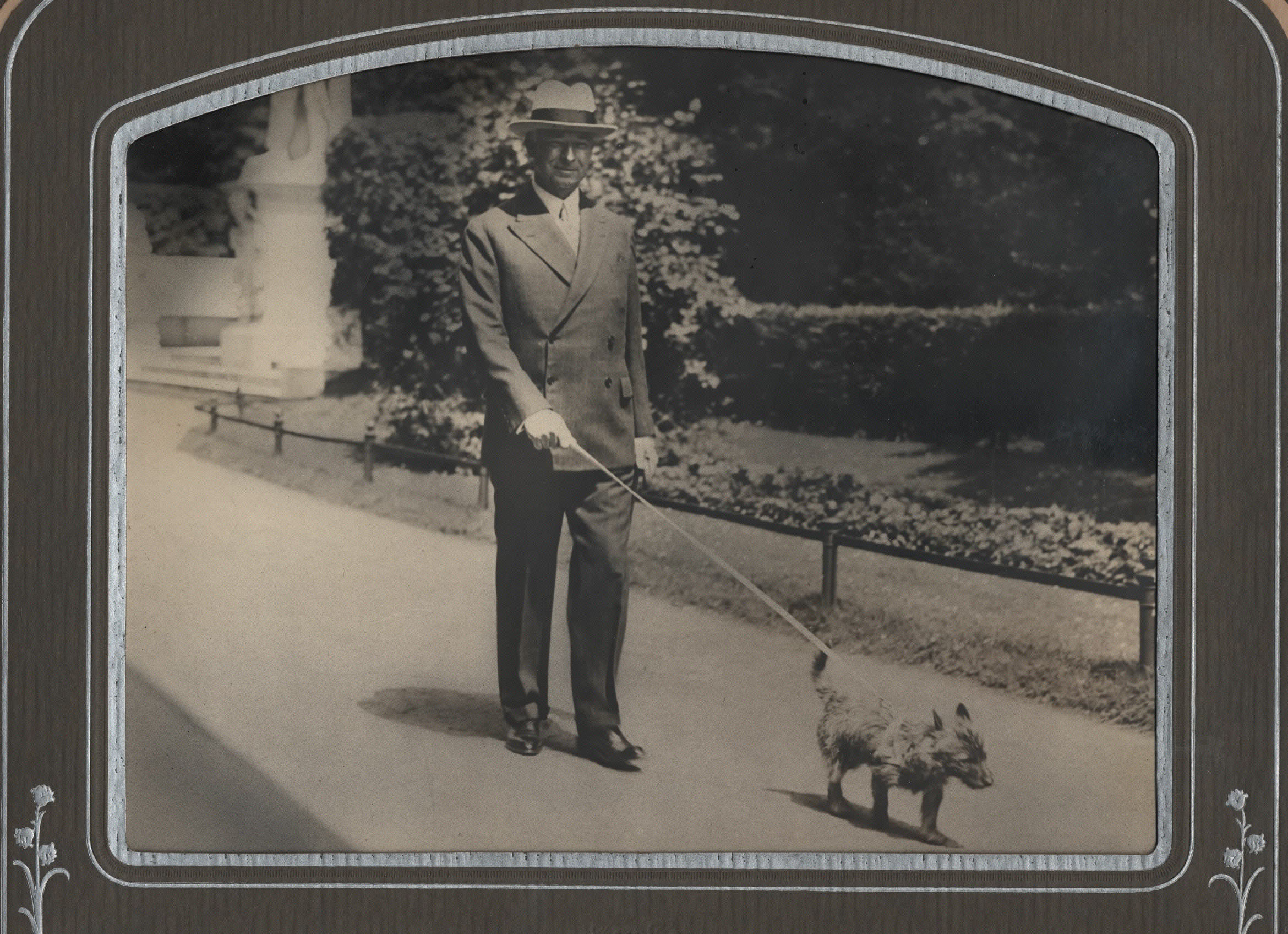
Will Hogg in Berlin (1930)
From the Hogg Family collection
A framed sepia portrait from 1930 shows Will Hogg—dressed sharply in a suit and hat, holding a small dog on a leash—smiling while strolling through a park in Berlin.
Ima Hogg talks about her experience with mental illness and Dr. Austen Riggs (1961)
From the Hogg Family collection
In this 1961 interview, Ima Hogg recalls her own experience seeking care through psychiatrist Dr. Austen Riggs for her insomnia in 1922. She recalls Dr. Riggs’ philosophy, that “every person must have a purpose in life” and his insistence that factors in childhood determined one’s motivation to achieve this purpose. In this sense, Ima was inspired by Dr. Riggs to focus primarily on education and the mental health of children in her philanthropy—an outlook that shaped her direction for the Hogg Foundation.
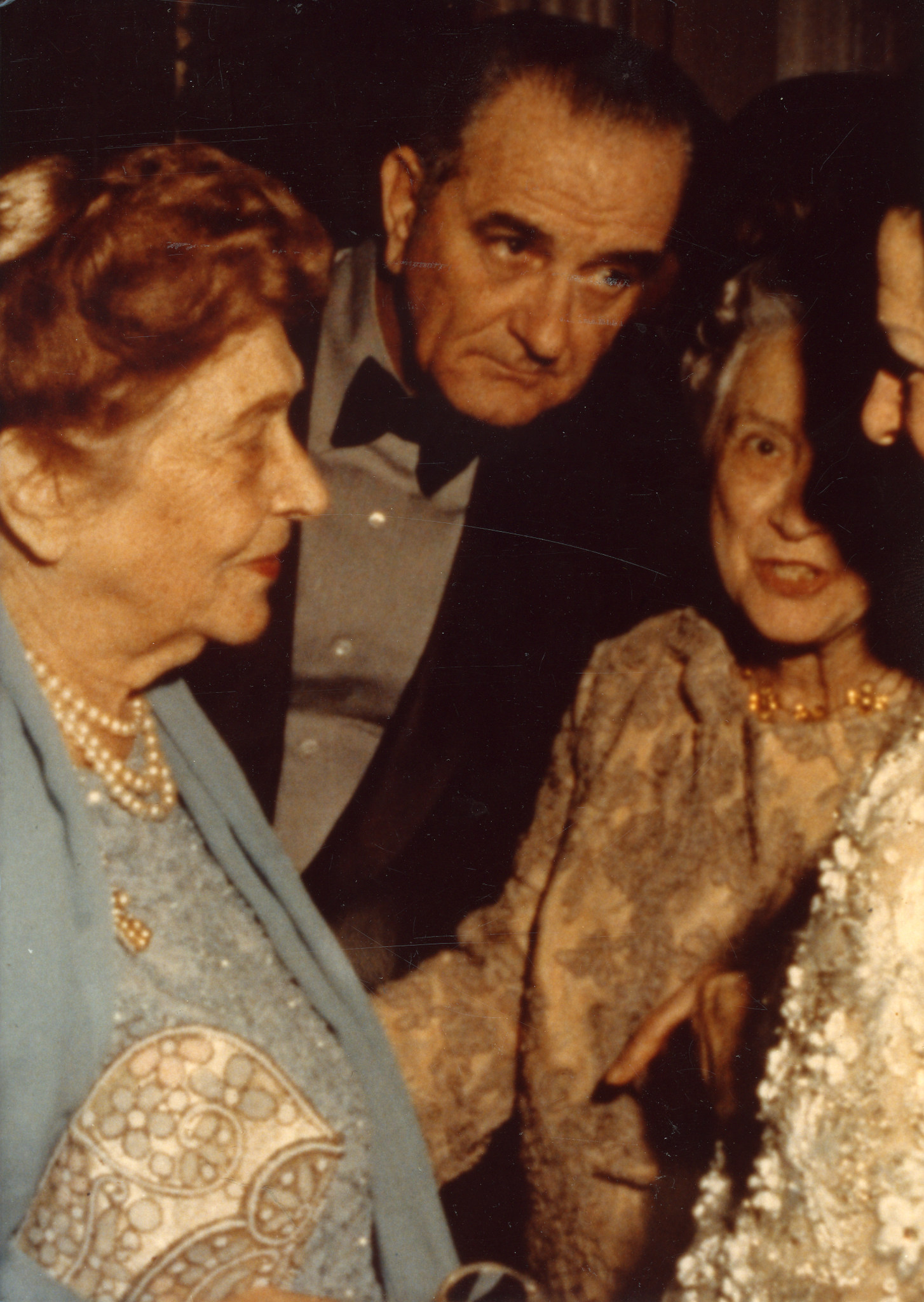
Ima Hogg with Lyndon Baines Johnson (1960s/1970s)
From the Hogg Family collection
In this photo, taken sometime in the 1960s or 1970s, Ima appears alongside President Lyndon Baines Johnson.

